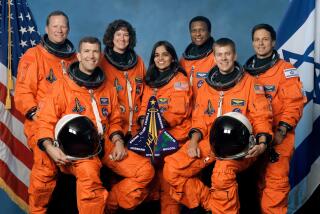The Tragedy of the Space Shuttle Challenger
- Share via
When the first lung-fish crawled out of the sea and lay gasping on the land, many died and many returned to the sea. When our first half-human ancestors looked out from the forests and left the safety of the trees for the unknown savannah, there was danger. When ancient mariners first began to sail their fragile ships beyond the sight of shore and into the unknown, there were risks and losses.
When mankind began to erect cities that offered greater comfort and security, and when they raised the great cathedrals to celebrate the greater glory of God, lives were lost in the quarries and on the scaffolds. When scientists such as Walter Reed first began to confront the mysteries and uncertainties of contagious diseases in the search for a cure, man succumbed to the ailments they studied, a price for advancing the knowledge of mankind.
In any large-scale human endeavor that has worked to the benefit of mankind, there has been pain and sacrifice and loss. We stand now at one of the pivotal points in history. We can say “no” to the unknown mysteries of space, turn our backs, and announce our decline as a civilization. Or we can look at the stars, express our grief at the loss of the Challenger and its crew, and then honor their lives by saying, “We shall continue.”
JAMES A. BRUNET
Santa Monica






